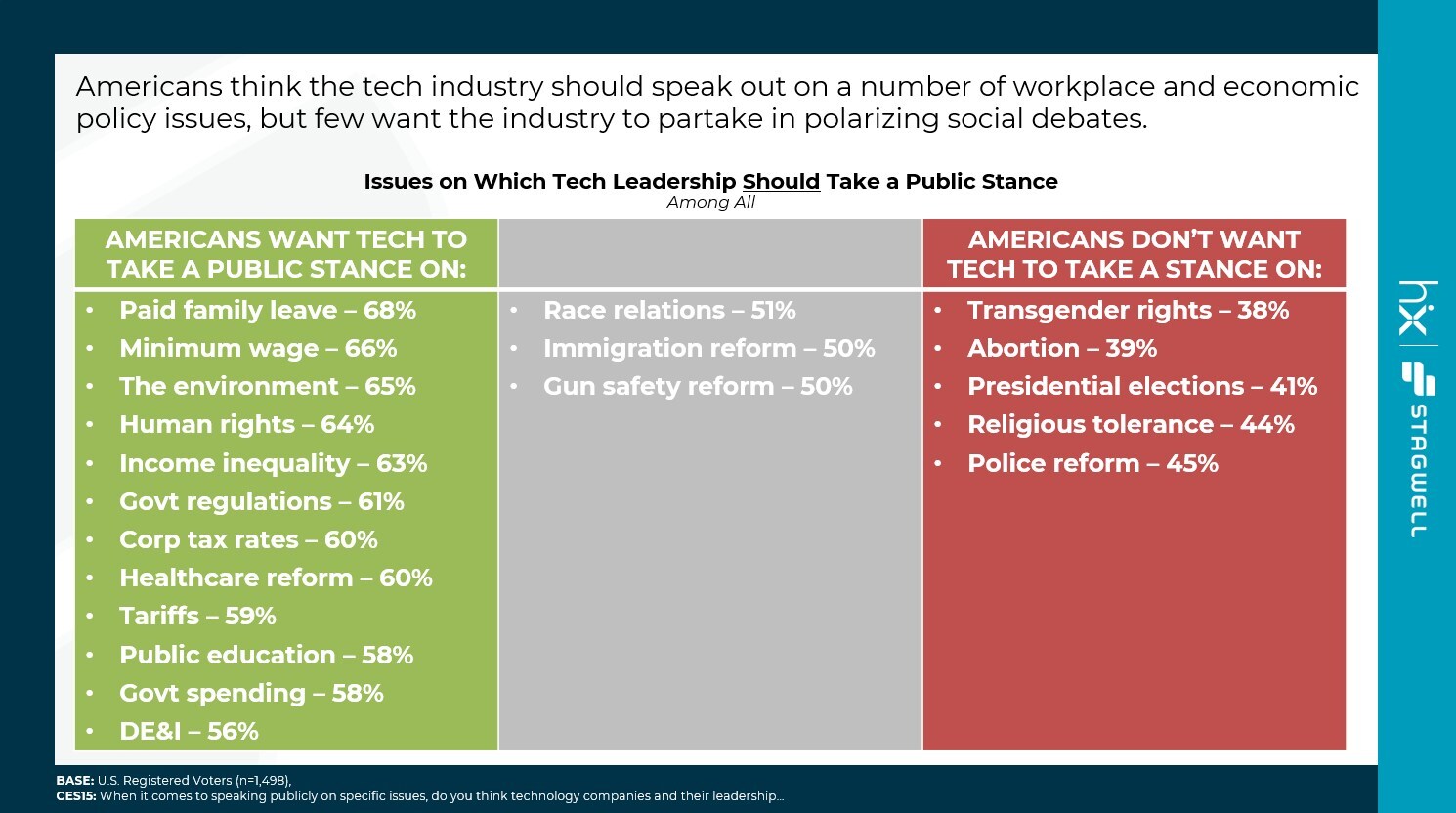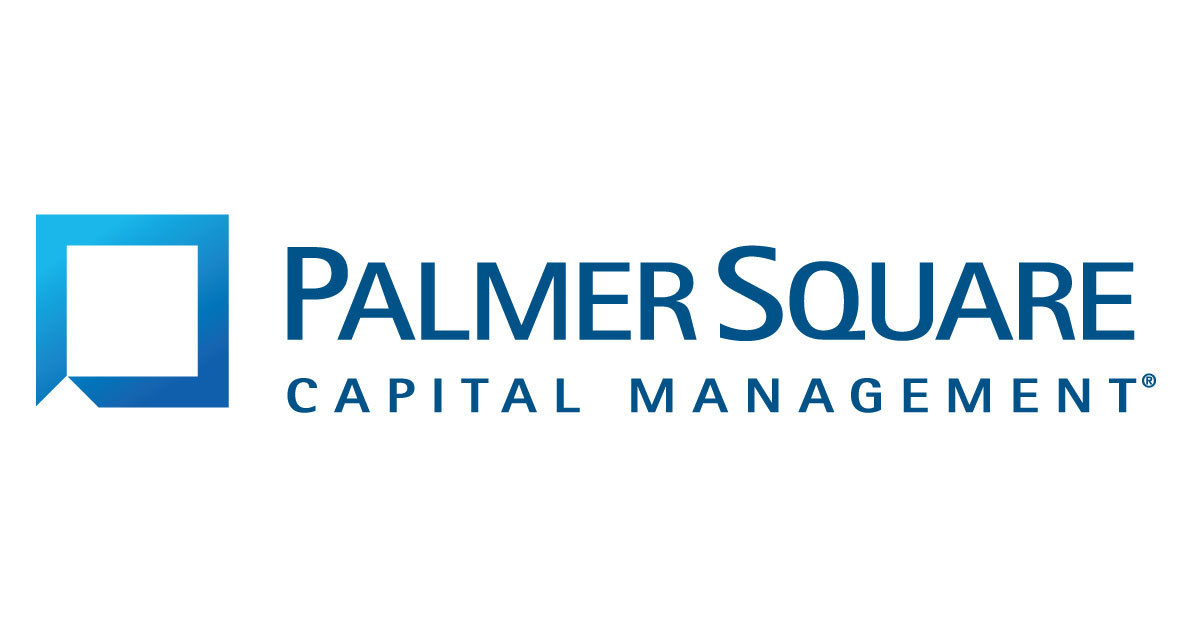General public wants tech CEOs to speak out on workplace and economic issues, but say the industry should stay clear of political and social issues
Americans think AI will have a negative impact on jobs, but few expect to be impacted directly
NEW YORK, Jan. 14, 2025 -- As the United States enters a new administration next week, Stagwell (NASDAQ: STGW) and HarrisX released a new nationwide poll showing the tech sector is entering 2025 with one of the strongest reputations across industries. The study, released during the annual CES conference, and made available online today, reveals four in five (81%) Americans view the industry favorably, placing tech on par with the manufacturing sector (80%) and far ahead of many other industries, including healthcare (65%), oil and gas (60%), pharmaceutical (52%) and news media (51%).
Nearly four in five (79%) U.S. adults say tech has a positive economic impact and 57% expect the industry to be a major economic driver over the next five years. For comparison, approximately just one in three Americans think the real estate (35%) and auto (32%) industries will play a major role in the U.S. economy.
However, while a majority of Americans (55%) want the leaders of technology companies to speak up on issues affecting industry and society, sixty percent say these leaders mostly get it wrong when they speak up. Respondents indicated that they want tech leaders to focus more on workplace and governance issues and less on divisive social and political themes.
Workplace and economic issues appear to be the safest topics for tech leaders to take a stance on. While a strong majority say tech CEOs should speak up on issues such as paid family leave (68%), minimum wage (66%) or the environment (65%), significantly fewer believe they should take a public stance on social and political issues such as transgender rights (38%), abortion (39%) or elections (41%).
"For three decades the technology sector has defined the 'new economy' and modern opportunities, in the process building a very strong reputation," said Dritan Nesho, CEO of technology research firm HarrisX. "As it now embarks to once again reshape the global labor and economic landscape via A.I., Web3, and other novelties, the way tech CEOs navigate and address the impact of their innovations, and the regulations that will surely follow, will determine how the industry is perceived and treated for decades to come."
The heads of Stagwell's Risk and Reputation practice added their analysis on the data during a roundtable at CES.
Zac Moffatt, the CEO of Targeted Victory and the Republican co-Chair noted that "the landscape of public discourse has shifted with the 2024 presidential election, and companies need to quickly rewrite the playbook of how to engage with both the public and government over the next several years."
Nevertheless, public sensitivities on several key themes such as the environment, human rights, income inequality, and DE&I remain strong, added Doug Thornell, CEO of SKDK, and the Democratic co-Chair, "The risk of dismissing these themes is high. The years ahead require both balance and courage."
The Stagwell/HarrisX poll, which was conducted online January 3-6, 2024 with 1,498 registered voters, also shows that 67% of voters want tech companies to work with the incoming Trump administration. Nearly as many (58%) also believe the Trump presidency will provide a boost for the technology industry. Just 27% think tech companies will be worse off under President-elect Donald Trump.
The study also shows that as the tech industry and financial investors are doubling down on AI, Americans are less certain about its economic impact. While 60% think AI will replace more jobs than create new ones, just 30% of Americans believe AI will decrease their personal earnings in the future.
The public uncertainty towards AI is also reflected by the fact that voters are evenly divided on the approach they think the U.S. government should take in regulating the new technology. Fifty-three percent say the government should first monitor the development and implementation of AI versus 47% who say it's better to start regulating AI right away.
In the post-election landscape, Stagwell and HarrisX are committed to helping businesses navigate the political crosshairs. For more information on how Stagwell's Risk and Reputation Unit can help navigate the political minefield, visit https://www.stagwellglobal.com/risk-reputation-unit/.
Survey Methodology
The survey was conducted online within the United States January 3-6, 2025 among 1,498 registered voters in the United States by HarrisX. The sampling margin of error of this poll is +/-2.5 percentage points. The results reflect a nationally representative sample of registered voters. The survey sample was weighted for age, gender, region, race/ethnicity, income, and region where necessary to align it with the actual proportions in the population.
About HarrisX
HarrisX is a leading public opinion research, data analytics, and strategy consulting company with offices in the United States, United Kingdom, Canada and Singapore. HarrisX conducts multi-method research in over 50 countries around the world on behalf of Fortune 100 companies and philanthropic organizations, public policy institutions, global leaders, media and NGOs. HarrisX is a proud member of Stagwell Global (STGW). Learn more at www.harrisx.com.
About Stagwell
Stagwell is the challenger holding company built to transform marketing. We deliver scaled creative performance for the world's most ambitious brands, connecting culture-moving creativity with leading-edge technology to harmonize the art and science of marketing. Led by entrepreneurs, our specialists in 35+ countries are unified under a single purpose: to drive effectiveness and improve business results for our clients. Join us at www.stagwellglobal.com.
This News is brought to you by Qube Mark, your trusted source for the latest updates and insights in marketing technology. Stay tuned for more groundbreaking innovations in the world of technology.









